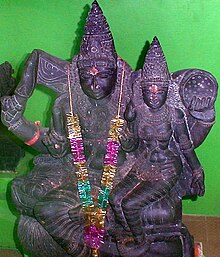Ila (Hinduism)
| Ila/Ilā | |
|---|---|

Budha with consort Ilā
|
|
| Devanagari | इल/इला |
| Sanskrit transliteration | Ila/Ilā |
| Consort | Budha (as a woman) |
Ila (Sanskrit: इल) or Ilā (Sanskrit: इला) is an androgyne in Hindu mythology, known for their sex changes. As a man, he is known as Ila or Sudyumna and as a woman, is called Ilā. Ilā is considered the chief progenitor of the Lunar dynasty of Indian kings - also known as the Ailas ("descendants of Ilā").
While many versions of the tale exist, Ila is usually described as a daughter or son of Vaivasvata Manu and thus the sibling of Ikshvaku, the founder of the Solar Dynasty. In versions in which Ila is born female, she changes into a male form by divine grace soon after her birth. After mistakenly entering a sacred grove as an adult, Ila is either cursed to change his/her gender every month or cursed to become a woman. As a woman, Ilā married Budha, the god of the planet Mercury and the son of the lunar deity Chandra (Soma), and bore him a son called Pururavas, the father of the Lunar dynasty. After the birth of Pururavas, Ilā is transformed into a man again and fathered three sons.
In the Vedas, Ilā is praised as Idā (Sanskrit: इडा), goddess of speech, and described as mother of Pururavas.
The tale of Ila's transformations is told in the Puranas as well as the Indian epic poems, the Ramayana and the Mahabharata.
According to the Linga Purana and the Mahabharata, Ilā was born as the eldest daughter of Vaivasvata Manu, the progenitor of mankind, and his wife Shraddha. However, the parents desired a son and so prayed and performed austerities to propitiate the deities Mitra and Varuna, who changed Ilā's gender. The boy was named Sudyumma. The Bhagavata Purana, the Devi-Bhagavata Purana, the Kurma Purana, the Harivamsa, the Markandeya Purana and the Padma Purana (referred to as "Bhagavata Purana et al. texts" further) narrate a variant: Ila's parents could not have any children for a long time and approached the sage Agastya for a solution. The sage performed a yajna (fire sacrifice) dedicated to Mitra and Varuna to attain a son for the couple. Due to either an error in the ritual, or a failure to offer the appropriate sacrifice, Mitra and Varuna instead sent a daughter to the couple. In one version, the couple supplicated the deities, who transformed Ilā's gender. In another version, this transformation happens after the erroneous hymns are rectified and the son is called Ila. According to a variant, Shraddha wished for a daughter; Vashistha heeded her wish while performing the sacrifice and thus, a daughter was born. However, Manu desired a son so Vashistha appealed to Vishnu to change the gender of his daughter. Ilā was renamed Sudhyumna. The accounts describe Ila as either the eldest or the youngest child of Manu. As the child of Manu, Ila had nine brothers, the most notable was Ikshvaku, the founder of the Solar dynasty. As the son of Manu, Ila is the grandson of Surya. According to another account found in the Vayu Purana and the Brahmanda Purana, Ilā was born female and remained female.
...
Wikipedia
